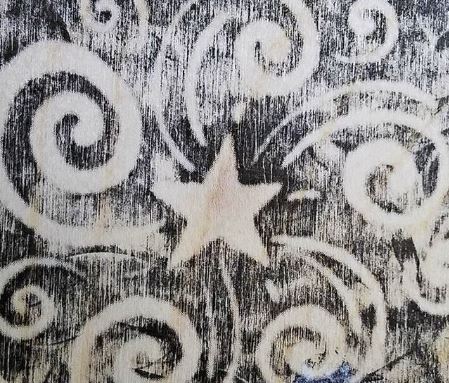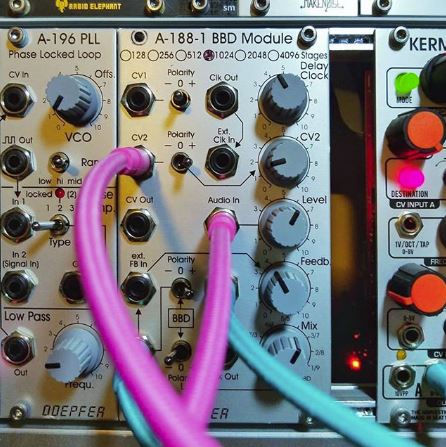I figured out what to do with those pesky pedals. Simply using a wire tie to strap a couple of composite shims to the back will let them sit vertically atop the modular case and prevent them from tipping over — assuming I push the back of the case up against the wall. We’ll see.

Pyrography on the case isn’t underway quite yet, but there’s a heat transfer from a laser printer on it. I kind of like the looks of it as is, but there are sections not filled in (to conserve ink) and some guide lines that came through dark and muddy. So I’m willing to wait a bit more for actual pyrography.
Those small speakers are not wonderful. They’re cheap and small and unobtrusive, but even for gaming I definitely hear the difference. Still, I’ll get used to it, and it’s not like the acoustic setup really did justice to the studio monitors I had.
I haven’t yet mentioned the Doepfer BBD I picked up, for a price I found too hard to resist. This is a “Bucket Brigade Device” — the precursor to a digital delay, which works by passing signals like a hot potato along a chain of capacitors. It’s obsolete technology. So are vacuum tubes, but that doesn’t stop a lot of guitarists from preferring their character…

The length of delay in a BBD is determined by the number of stages (which is fixed on the chip) and the clock rate. Slower clock rates result in two or three kinds of signal degradation as well as an audible whine. For that reason, most BBD delays have heavy low-pass filtering and restricted clock rates, and only give “dark” echoes. For some musicians, just throwing an LPF onto a digital delay is a close enough approximation to get that kind of sound.
But Doepfer’s BBD is special. To encourage experimentation, it eschews the filters and clock rate restrictions, and opens up the circuit to manipulate or synchronize to it. 1024 stages is ideal for flanging, and short enough to work for comb filtering and Karplus-Strong synthesis, but for actual echoes it needs a slow clock which adds a lot of dirt and whine. But there are software plugins that can surgically remove the whine while leaving the more interesting grunge, and without making the whole echo super-dark. Or I can insert a clean delay into the BBD’s feedback loop, extending the echo time while having full control over the sound character. Direct manipulation of the clock, and using the clock itself as an audio source, leads to all kinds of other places that you just can’t get outside of modular synthesis in general and this circuit design in particular.
